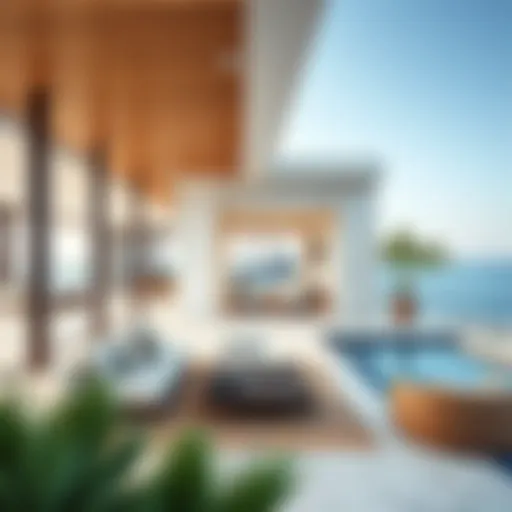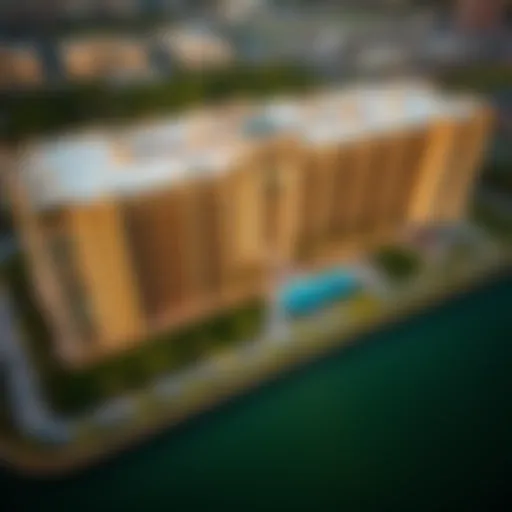Explore Five Iconic Hotels in Dubai's Luxury Scene
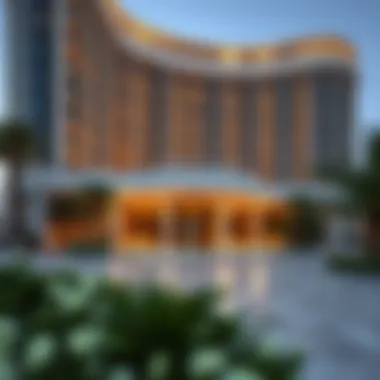

Intro
When one mentions Dubai, the image of opulence and grandeur instantly springs to mind. This city, often dubbed as the jewel of the Middle East, is not just famed for its towering skyscrapers and bustling souks, but it has also carved a niche in the hospitality sector with an array of magnificent hotels. Travelers from all corners of the globe flock to Dubai, lured by the promise of luxury combined with comfort. But beyond just being a playground for tourists, the hotel industry in Dubai offers lucrative prospects for investors looking to tap into the thriving real estate market.
In this article, we will embark on a journey through five prominent hotels that embody the essence of Dubai’s luxurious offering. Each establishment is a testament to unique architectural designs, world-class service, and exclusive amenities that keep tourists returning year after year. Moreover, we will discuss notable market trends, investment opportunities, and the overall impact of these hotels on the landscape of Dubai's bustling property market.
As we explore these hotels, expect to gain insights into what sets them apart, their architectural features, and how they influence real estate dynamics in Dubai. The article aims to serve as a valuable resource for not just potential visitors but also investors and real estate professionals keen to understand the nuances of Dubai’s hospitality scene.
Overview of Dubai's Hospitality Sector
Dubai's hospitality sector shines like a diamond in the desert, playing a pivotal role in the broader economy of the emirate. Renowned for its luxurious accommodations and exceptional service standards, the hotel industry has established itself as a cornerstone in attracting foreign direct investment and boosting tourism. This particular dynamic impacts not only the hospitality businesses but also various ancillary services, from transportation to retail, creating a ripple effect felt across the economy.
Significance in the Economy
The significance of the hospitality sector in Dubai's economy cannot be overstated. With attractions like the Burj Khalifa and the expansive shopping malls accompanying luxurious hotels, the city draws millions of visitors each year. In 2019, before the pandemic, Dubai welcomed over 16 million international tourists.
- Contribution to GDP: The sector contributes a substantial percentage to Dubai’s gross domestic product (GDP). According to various reports, travel and tourism directly contributed around 11% to the GDP in 2019. The ripple effect includes gains in employment and income for other industries, fostering overall economic health.
- Job Creation: The hospitality industry is a significant employer, providing diverse job opportunities ranging from entry-level positions to management roles. It not only nurtures the skills of its workforce but also facilitates professional growth, attracting talent from around the globe.
- Investment Opportunities: With continuous developments, investors are increasingly eyeing the hospitality sector. Major projects and renovations mark the constant evolution of Dubai's hotel landscape, which appeals to both domestic and international investors.
"In a city that blossoms with innovation and luxury, the hospitality sector is essential for sustaining its vibrant economy."
Market Trends
Keeping a keen eye on market trends is essential for understanding how the hospitality sector operates and evolves. Dubai's hotel scene is characterized by strong competition, enhanced services, and ever-changing guest expectations.
- Luxury and Experience-Based Offerings: Modern travelers seek more than just a stay; they desire experiences. Hotels are redesigning services to include unique local experiences, wellness options, and immersive cultural programs, appealing directly to the desire for personalized travel encounters.
- Technology Integration: The push for technology has grown exponentially. With amenities like mobile check-ins, smart room controls, and personalized apps for guests, hotels are embracing digital solutions to enhance guest satisfaction.
- Sustainability Focus: There’s a growing trend toward eco-friendly practices. With climate-conscious travelers in mind, many hotels are adopting sustainable initiatives, whether through energy-efficient operations or community-oriented programs.
The hospitality sector in Dubai, thus, serves as both a significant economic driver and a barometer of evolving consumer preferences. Understanding these facets is crucial for potential investors and stakeholders looking to grasp the full spectrum of opportunities present in the region's hotel landscape.
Criteria for Selection of Hotels
In a bustling metropolis like Dubai, the hospitality sector is not merely about providing a place to stay; it’s about crafting a comprehensive experience that enhances the visitor's journey. When assessing hotels, several criteria stand out as essential for understanding what makes a hotel truly exceptional. This guide will explore three primary criteria: guest experience, architectural innovation, and sustainability practices. Each of these elements plays a pivotal role in shaping the image and operational success of a hotel in Dubai.
Guest Experience
The guest experience is at the heart of the hospitality industry, and in Dubai, it takes on unique nuances. From personalized services to luxurious room amenities, every detail counts. Hotels that prioritize the guest experience often employ well-trained staff who can attend to individual needs and preferences, creating a bespoke environment for every visitor.
Moreover, the way hotels interact with their guests can significantly influence overall satisfaction. It's not uncommon for establishments to provide curated experiences such as private dining, exclusive tours, or wellness sessions tailored to each visitor's desires. For hotel investors, understanding the importance of what guests value—like easy check-ins, facilities for families, or pet-friendly environments—can guide them in making informed investment decisions.
Architectural Innovation
Dubai is synonymous with architectural feats that push the limits of creativity and design. Hotels are no exception, often serving as examples of innovation. The architectural design not only contributes to the aesthetic appeal but also to the functionality and sustainability of the space. Hotels that incorporate regional influences alongside modern design elements often resonate more with both locals and tourists.
For instance, a hotel that echoes the flowing lines of the desert dunes or incorporates elements of traditional Emirati culture can create a sense of place that enhances a visitor’s stay. Investors should consider how architectural choices impact marketability. Unique designs can become landmarks, drawing in tourists eager to experience not only luxurious accommodations but also a visually stunning backdrop.
Sustainability Practices
The modern traveler is increasingly conscious of their environmental footprint. As a result, sustainability has become a non-negotiable aspect of hotel operation in Dubai. Establishments that implement green practices not only contribute to environmental well-being, but they also appeal to a growing segment of eco-conscious travelers.
Common sustainable practices include energy-efficient systems, water conservation strategies, and the use of locally-sourced materials. Some hotels have gone the extra mile by establishing organic gardens on their properties or collaborating with local charities to support community efforts. For developers and investors, aligning with these sustainable approaches can enhance reputation and comply with regulations aimed at making Dubai a greener city.
Investing in hotels that focus on sustainability is not just about compliance; it’s about future-proofing the business in an increasingly eco-aware market.
Hotel One: Features and Highlights
The significance of Hotel One within the ambitious landscape of Dubai's hospitality sector is remarkable. As a cornerstone of luxury and comfort, this establishment provides a unique blend of state-of-the-art design and exceptional amenities. Understanding Hotel One's features is essential, especially for investors and travelers who seek both opulence and a distinct experience.
Architectural Design
Innovative Structures
When discussing Innovative Structures, it’s impossible to overlook how these designs influence not just aesthetics but also function within the broader context of tourism. Hotel One employs cutting-edge architectural techniques that not only optimize the use of space but also enhance energy efficiency. A key characteristic of these structures is their sleek, modern lines, which seem to defy gravity, creating a striking skyline silhouette.
A standout feature of this design is the integration of smart technology into the architecture. From automatic climate control to energy-efficient lighting, these innovations present a valuable advantage for environment-conscious guests. However, the primary disadvantage may be the higher costs associated with the construction of such advanced facilities, which can impact the pricing strategy.
Cultural Influences
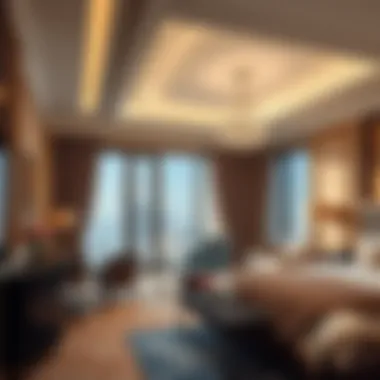

Delving into Cultural Influences, we find that Hotel One reflects both the rich heritage and modern aspirations of Dubai. This hotel showcases elements from both traditional Middle Eastern architecture and contemporary design, striking a balance that appeals to diverse guests. The warm colors and intricate patterns found in the lobby echo the historical structures found throughout the region.
What makes this cultural infusion particularly appealing is the unique storytelling it offers. Guests are not just staying in a hotel; they're experiencing the vibrant tapestry of local culture. Yet, while this blend is characteristic of the hotel, there can be challenges in maintaining this balanced approach, especially when catering to a global clientele with varied tastes.
Amenities Offered
Dining Options
In terms of Dining Options, Hotel One offers a selection that rivals some of the best culinary experiences worldwide. The restaurants provide a variety of cuisines, from lavish buffets featuring local delicacies to exclusive fine dining experiences. A key characteristic here is the use of locally sourced ingredients, promoting sustainability while ensuring freshness and flavor.
A unique feature of these dining establishments is the themed culinary nights that invite guests to immerse themselves in different cultures. However, one challenge might be the pricing structure, which can reach premium levels, possibly deterring budget-conscious visitors.
Recreational Facilities
When it comes to Recreational Facilities, Hotel One leaves no stone unturned. Guests can choose from expansive pools, luxurious spas, and well-equipped fitness centers. A primary draw of these facilities is that they provide an all-inclusive experience for guests, allowing them to unwind without stepping outside the hotel.
One notable feature is the rooftop relaxation area that offers breathtaking views of the Dubai skyline, creating a perfect backdrop for social gatherings or tranquil moments. Still, there are points of contention regarding overcrowding during peak seasons, which might detract from the overall experience for some travelers.
In summary, the combination of Architectural Design and Amenities at Hotel One plays a pivotal role in its appeal. Each element contributes to a formidable brand that attracts a mix of business travelers and tourists alike, ensuring a lasting impression on Dubai's hospitality landscape.
Hotel Two: An In-Depth Look
Exploring Hotel Two is essential for understanding the nuances of luxury accommodation in Dubai. This hotel distinguishes itself through its deliberate blend of exclusivity and classical charm, making it not just a place to stay but an experience to savor. For both leisure travelers and corporate guests, it offers a unique entry point into the luxury market within the emirate.
Unique Selling Points
Exclusive Services
At the forefront of Hotel Two's proposition are its exclusive services, which cater to discerning guests seeking a unique experience. One distinct feature is the dedicated concierge service available 24/7. This is not your average front desk assistance; it’s a team of seasoned professionals ready to fulfill requests ranging from private jet arrangements to personalized city tours. This level of attentiveness is a game-changer in the hospitality field, ensuring each interaction is tailored to the guest's desires.
Moreover, the hotel’s butler service adds another layer of hospitality, where guests can rely on personal attendants for everything from unpacking luggage to organizing refreshments in the room. These exclusive services elevate the overall guest experience, making it not just about luxury, but about personalization in every possible way.
Luxury Experiences
When it comes to luxury experiences, Hotel Two excels in providing a blend of opulence and cultural immersion. A notable offering is its rooftop infinity pool boasting panoramic views of the skyline. This pool isn’t just a place to relax; it’s a lavish retreat where guests can sip on bespoke cocktails while soaking in the sun.
In addition to the pool, the hotel features a renowned spa that combines traditional therapies with modern wellness trends. The unique treatment menus not only pamper guests but also incorporate local healing practices, ensuring an authentic experience that tells the story of Dubai’s rich cultural heritage. This attention to creating luxury experiences strengthens its position as a preferred choice for travelers who want an indulgent getaway that also resonates on a personal level.
Guest Reviews and Feedback
Positive Aspects
Guests often highlight the positive aspects of their stay at Hotel Two, primarily praising the exceptional level of service. Many have noted that the staff greet them by name, creating an atmosphere of warmth and familiarity. This personal touch is frequently mentioned in reviews and is a significant reason why many choose to return.
Another recurring theme is the hotel’s location. Nestled in the heart of Dubai, it offers proximity to both business districts and leisure attractions. Reviewers have appreciated how the convenient location allows for easy access to cultural landmarks and shopping centers, making it ideal for both leisure and business travelers.
Areas for Improvement
While many reviews are positive, there are areas for improvement that surface consistently. Some guests have pointed out that during peak seasons, the hotel can become quite crowded, leading to longer wait times at restaurants and the lobby. This leads to a less personalized experience, which seems to clash with the hotel’s otherwise high standards of exclusivity and service.
Moreover, some feedback has called attention to the hotel’s pricing, which could be perceived as steep. While luxury comes with a premium, potential guests often consider whether the amenities and services justify the costs, especially in comparison to competing hotels that might offer similar benefits at a more accessible price point. Addressing these issues might enhance overall guest satisfaction and provide valuable insights into market expectations.
"The charm of Hotel Two lies not just in its services, but in the memories it helps create for each guest."
In summary, Hotel Two stands as a pillar in Dubai's hospitality landscape, showcasing the seamless blend of exclusivity, luxury, and cultural integration. Yet, like any establishment, it has its peaks and valleys. By addressing feedback effectively, this hotel can continue to elevate its esteemed reputation.
Hotel Three: Market Positioning
Understanding the market positioning of hotel three is essential to comprehend its standing in Dubai's competitive hospitality landscape. This hotel often attracts both business travelers and leisure tourists, enabling a diversified clientele and strategic branding. With a careful selection of market strategies, this hotel successfully appeals to varying demographics while standing out in a crowded field.
Target Demographics
Business Travelers
Business travelers often seek convenience and efficiency during their stays, making the business amenities a significant focus at this hotel. They usually look for features like high-speed internet, quiet workspaces, and proximity to major business districts. The clear advantage is all about productivity – after a long day of meetings, a comfortable room becomes essential. This hotel's establishment caters to these needs, enhancing its appeal.
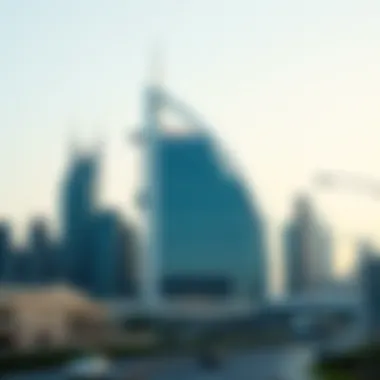

- Key Characteristics: Business travelers typically prioritize locations near convention centers, airports, and corporate hubs. They appreciate seamless check-in processes and 24-hour services.
- Unique Features: Amenities such as meeting rooms, business lounges, and concierge services serve specifically to enhance their experience. These offerings are particularly attractive for traveling professionals wishing to maintain their pace without major disruptions.
- Advantages: Focusing on this demographic not only drives direct bookings but also creates partnerships with companies seeking group accommodations for employees. Plus, business travelers often have higher budgets, which could lead to increased revenue.
Leisure Tourists
On the opposite side of the spectrum, leisure tourists seek enjoyable experiences and relaxation during their travels. They are drawn to attractions like unique dining options and recreational facilities offered by the hotel.
- Key Characteristics: Leisure tourists generally prioritize comfort and unique experiences – they’re often looking for relaxation amidst their explorations of the city.
- Unique Features: This hotel frequently offers tailored packages that interweave local experiences, such as cultural outings or spa services. These features can create memorable stays, making the hotel a must-visit again.
- Advantages: This dual appeal allows the hotel to create a balanced revenue stream. Investing in leisure-oriented amenities can capture family groups, couples, and solo travelers, while encouraging return visits through unique experiences.
Pricing Strategies
Pricing plays a crucial role in market positioning and often reflects the overall strategy of the hotel. The hotel employs a mix of dynamic pricing, loyalty programs, and seasonal promotions to appeal to its diverse clients.
- Dynamic Pricing: This strategy adjusts rates based on demand, allowing the hotel to maximize revenue during peak times while attracting guests during quieter seasons.
- Loyalty Programs: Offering rewards to returning guests can ensure repeat business, creating a steady flow of revenue that benefits overall standing in the market.
- Seasonal Promotions: Strategically timed discounts or packages can draw in new guests, especially during tourism peaks in Dubai.
Regardless of the target market, the hotel’s pricing strategies ensure that it remains competitive, enhancing its positioning through value-added offers and customer-centric approaches.
In summary, understanding the market positioning of hotel three, particularly focusing on its targeted demographics and pricing strategies, provides valuable insight for potential investors and stakeholders in Dubai's hospitality sector.
Hotel Four: Architectural Significance
Architecture in Dubai goes beyond mere aesthetics; it encapsulates culture, innovation, and evolution within the hospitality sector. In this segment, we delve into the architectural significance of Hotel Four, focusing on its design philosophy and how well it integrates with its surroundings. This exploration will show how this hotel acts not only as a place to stay but also as a landmark and conversation starter within the vibrant tapestry of Dubai’s skyline.
Design Philosophy
Modern vs Traditional
When examining Hotel Four, the contrast between modern and traditional architecture stands out. The harmonious blend of these elements signifies innovation while respecting local heritage. The sleek lines and glass facades that characterize modern design bring a sense of luxury and sophistication, appealing to higher-end travelers looking for the latest in comfort and technology. Conversely, traditional elements like mashrabiya screens and domed roofs ground the hotel in the local culture, offering visitors a taste of Arabic heritage.
This combination results in a unique atmosphere that engages the eye and the mind. For visitors and investors alike, this thoughtful integration is a major selling point. It not only enhances the guest experience but also positions the hotel distinctly within the competitive Dubai market. However, balancing these two styles can be tricky; if not executed well, it may lead to a disjointed appearance that confuses rather than captivates the audience.
Use of Space
The use of space within Hotel Four is another vital aspect of its architectural allure. The break from conventional layouts offers a thoughtful design that maximizes both aesthetics and function. For instance, the open-plan lobbies not only invite light and air but also create an inclusive atmosphere that encourages social interaction among guests.
Key features of this space utilization include multi-functional areas that can adapt to various events or needs. A stunning roof terrace that hosts a lounge by night while serving as a brunch venue by day encapsulates this versatility. This fluidity can be particularly advantageous for hosting business meetings or social gatherings, thus appealing to a broad audience. However, the potential downside might be the risk of overwhelming guests with too many activity choices, making it critical for management to maintain a balance between variety and clarity.
Integration with Surroundings
Hotel Four’s architectural significance also stems from its thoughtful integration with the surroundings. Positioned amidst lush gardens and stunning Dubai landmarks, the hotel does more than just occupy space; it enhances its environment. The design takes cues from the local landscape, incorporating elements like native plants into its outdoor areas, thereby promoting not just aesthetics but also sustainability.
Furthermore, its proximity to cultural sites encourages guests to explore and engage with the local culture. This aspect of integration enhances the overall experience, making the hotel a true part of the Dubai narrative rather than a mere participant. The architecture creates pathways and views that invite visitors to immerse themselves in their surroundings, echoing the city’s blend of tradition and modernity.
In summary, the architectural significance of Hotel Four lies in its unique design philosophy and seamless integration with the surrounding environment. By blending modern aesthetics with traditional elements, it creates an inviting and engaging experience for guests. This not only serves the current market but stands as a testament to what modern hospitality architecture can achieve in a city known for its groundbreaking design.
Hotel Five: Sustainability and Innovation
In the rapidly evolving landscape of Dubai's hospitality sector, sustainability and innovation are taking center stage, especially in the context of Hotel Five. Today, sustainability goes beyond just being a trendy buzzword; it reflects a genuine commitment to environmental stewardship and responsible tourism practices. This section will delve into the crucial initiatives that Hotel Five undertakes, as well as how technology enhances guest experiences, underpinning the establishment's ongoing relevance in a competitive market.
Environmental Initiatives
Hotel Five is not just another luxury accommodation; it aims to be a responsible player in the hospitality ecosystem. One of its primary environmental initiatives is the implementation of energy-efficient systems throughout the property. For instance, the hotel utilizes solar panels to generate a portion of its energy needs, thus reducing reliance on non-renewable sources.
Another crucial aspect is the hotel’s water conservation strategy. With advanced water-recycling systems, Hotel Five collects greywater for irrigation purposes, reducing overall water consumption without compromising the lush greenery adorning its premises.
Furthermore, efforts to decrease plastic usage are evident throughout the hotel. Guests are offered reusable water bottles upon arrival, and straws and stirrers are made from biodegradable materials. Spreading awareness is part of this initiative, as staff are trained to educate guests on the importance of sustainability, making it a communal effort.
These initiatives not only align with Dubai's broader environmental goals but also resonate well with the increasing number of eco-conscious travelers.
"A hotel's commitment to sustainability is like a candle in the dark; it sheds light and inspires others to follow suit."
Tech-Driven Guest Experiences
In an age where technology increasingly intersects with everyday life, Hotel Five leverages cutting-edge innovations to enhance guest experiences. Tech-driven guest experiences can be observed from the moment a reservation is made. Guests can book rooms through a user-friendly app, which also facilitates contactless check-in and check-out processes.
Inside the rooms, smart controls allow guests to configure lighting, temperature, and entertainment systems with just a touch or a voice command. With integrated systems, even the curtains and room service can be activated through smart technology.


Moreover, the hotel offers a digital concierge service, providing personalized recommendations for dining, entertainment, and activities tailored to individual preferences. For instance, if a guest mentions they are keen on art, the concierge might recommend nearby galleries or even arrange private tours with artists. This kind of tailored service enhances guest satisfaction and encourages repeat visits.
In the end, Hotel Five combines sustainability with innovation, creating an experience that is not only luxurious but also mindful of its impact on the environment. Investors looking for opportunities in this sector would do well to note this blend; it's what sets the hotel apart in a densely packed market.
Further Reading
Comparative Analysis of Selected Hotels
Comparative analysis of hotels is a pivotal aspect of understanding Dubai's ever-evolving hospitality sector. It allows for the identification of the nuances that define guest experiences. Considering various amenities, unique services, and architectural styles helps investors, travelers, and industry specialists navigate the multitude of choices available in this competitive market.
This section will highlight the essence of analysis in discerning the specific attributes that set each hotel apart while also recognizing overlapping features that enhance their collective appeal. By examining these elements, one can grasp how these establishments contribute not only to individual guest satisfaction but also to Dubai's larger narrative as a premier travel destination.
Similarities and Differences
In the context of Dubai's prominent hotels, drawing comparisons reveals the rich tapestry of hospitality experiences awaiting visitors. While each hotel boasts unique characteristics, there are commonalities that underscore the luxury branding of the city.
Key Similarities:
- Exquisite Design: All hotels exhibit outstanding architectural flair, marrying modernity with traditional influences. From sweeping glass façades to intricate interior designs, these hotels make a statement.
- Luxury Amenities: Spa services and fine dining are ubiquitous, catering to the upscale clientele that frequents these establishments. Visitors expect nothing less than top-notch treatments and culinary experiences.
- Robust Customer Service: The hospitality sector in Dubai prioritizes guest satisfaction, evidenced by highly trained staff available around the clock.
Notable Differences:
- Theme and Concept: Each hotel embraces a distinctive theme. For instance, one might reflect Emirati heritage, while another adopts a minimalist, contemporary vibe. This thematic approach helps guests select the hotel that best aligns with their personal preferences.
- Market Positioning: Some hotels are particularly tailored for business travelers, complete with high-tech conference room facilities and dedicated services. Others cater to leisure tourists, featuring expansive pools and recreational activities.
Identifying these similarities and differences not only enriches the visitor's choice but also nudges investors to consider potential partnerships based on overlaps and gaps in service offerings.
Overall Market Impact
The impact of these hotels on Dubai's hospitality market extends beyond mere occupancy rates. A few critical points illustrate this significance:
- Visitor Trends: The comparative analysis of hotels sheds light on changing visitor demographics and shifting preferences. As travelers search for tailored experiences, hotels evolve to accommodate these desires, impacting overall business strategies.
- Architectural Development: The architectural variety among hotels also pushes a competitive atmosphere, prompting new constructions and renovations that further enhance the city’s skyline, thereby drawing even more tourists.
- Market Positioning Dynamics: Through understanding how hotels differentiate themselves, investors can pinpoint market niches. This knowledge allows for smarter investment in the hospitality sector, leading to improved returns.
In summary, the comparative analysis of selected hotels in Dubai not only provides a clear picture of the current landscape but also helps forecast future developments in the hospitality industry, making it an invaluable resource for stakeholders across the board.
Future Trends in Dubai's Hospitality Industry
Dubai's hospitality industry is on the brink of significant transformations that cater to ever-evolving traveler needs and market dynamics. Understanding these future trends is essential, especially for investors, real estate agents, and developers looking to capitalize on opportunities in this vibrant sector. As the economy grows and tourism flourishes, hotels must adapt to remain competitive and relevant.
Emerging Technologies
With technology knocking on the doors of the hospitality sector, it’s no surprise that the adoption of cutting-edge solutions is reshaping how hotels operate. From AI-powered chatbots providing 24/7 customer service to smart room features allowing guests to control lighting and temperature through their smartphones, these advancements are endearing hotels to tech-savvy travelers.
- Mobile check-ins and digital keys: Many hotels offer apps through which guests can check in and access their rooms, enhancing convenience and cutting down wait times at the front desk.
- Data analytics: Hotels are now leveraging data to understand guest preferences, leading to personalized experiences that heighten satisfaction. For instance, using insights from previous stays, hotels can customize welcome amenities to align with a guest’s interests.
- Sustainable tech: The shift towards green technologies, like energy-efficient appliances and automated systems, not only reduces costs but also appeals to environmentally conscious travelers. These innovations help hotels minimize their environmental footprint while improving operational efficiencies.
"Incorporating technology into hospitality is no longer a luxury; it’s a necessity that can redefine guest experiences and operational workflows."
Shifts in Consumer Preferences
As consumer behavior evolves, understanding these preferences is crucial for hotels to align their offerings accordingly. Travelers today prioritize unique experiences over standard luxury. An increasing number of guests seek more than just a place to stay; they want immersive experiences that highlight local culture and community.
- Personalization: Modern guests favor tailored services. From bespoke itineraries to unique dining experiences, this trend emphasizes the importance of understanding individual desires.
- Health and wellness: The increasing focus on health and well-being has prompted hotels to expand wellness offerings. Features like a range of fitness programs, organic dining options, and wellness retreats are rapidly gaining traction.
- Remote work: The rise of remote work due to recent global events has shifted demand toward hotels offering conducive environments for working travelers. Amenities like high-speed internet, office spaces within rooms, and business lounges have become ever more vital.
As we look to the future, it's clear that the hotel industry in Dubai must be nimble and adaptable, continuously innovating to meet the preferences of a diverse and discerning clientele. By staying ahead of these trends, stakeholders can achieve sustained growth and foster lasting connections with their guests.
Epilogue and Insights
The hospitality sector in Dubai shines as a beacon of luxury and innovation, drawing millions of visitors every year. This article highlights the intricate tapestry of five standout hotels, each a microcosm of what makes Dubai a premier destination for travelers from all walks. As we've explored, these hotels aren’t just places to rest one's head; they are architectural marvels, social havens, and hubs of activity.
Recap of Key Points
- Significance of Hotel Selection: The hotels detailed were chosen based on a mix of guest experience, architectural innovation, and sustainability practices. These factors are essential for any discerning traveler or investor.
- Diverse Offerings: Each hotel showcases unique amenities, catering to different clientele—from the high-flying business traveler to families seeking leisure and comfort.
- Market Positioning: The comparative analysis sheds light on how these hotels carve out their niche in a competitive market, responding to evolving consumer preferences and economic dynamics.
- Future Trends: A peek into the future reveals emerging technologies and shifting consumer demands that will shape the landscape of Dubai's hospitality sector.
Implications for Investors and Travelers
For potential investors, understanding the nuances of Dubai's hotel market is crucial. The insights provided here can guide decisions, highlighting trends that suggest a move towards sustainability and tech integration. As consumers increasingly prioritize eco-friendly practices and immersive experiences, aligning investment strategies with these trends appears prudent. Travelers, on the other hand, gain valuable knowledge, equipping them to make informed choices that enhance their experience. Knowing the unique features and strengths of each hotel will help visitors not just book a room, but create lasting memories in a city that never ceases to amaze.
In summary, this guide serves not just as an informative resource, but as a bridge connecting the aspirations of investors with the desires of travelers. Both groups stand to benefit significantly from the knowledge shared, driving the continued success of Dubai's vibrant hospitality industry.
"Investing in Dubai’s hotel scene is not merely about financial returns; it’s about becoming part of a rapidly evolving narrative that defines luxury today."
For more information about Dubai’s hospitality landscape, you might consider visiting resources such as Wikipedia or Britannica.





